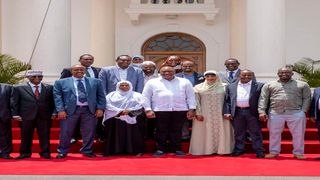
President Kenyatta (centre) with a section of Isiolo political leaders at State House, Nairobi on February 12, 2022. Photo |
| PSCUCounties
Premium
Uhuru’s stand on negotiated democracy risks Raila votes
What you need to know:
- President Uhuru Kenyatta has been candid on the need for inclusion and fairness.
- There has been growing resistance to negotiated democracy from residents and aspirants.
President Uhuru Kenyatta’s quest to consolidate over 800,000 votes in Northern Kenya for ODM leader Raila Odinga could be tested after he expressed reservations over negotiated democracy, which is widely practised in the region.
Elders from the majority pastoralist communities have met and agreed on the leaders to represent them in various elective posts in the August elections, with the names of aspirants made public.
President Kenyatta, who in the past three days has met delegations of leaders from Marsabit, Tana River, Mandera and Isiolo counties, has been candid on the need for inclusion and fairness.
When he met Marsabit leaders, led by Treasury Cabinet Secretary Ukur Yatani and North Horr MP Francis Chachu Ganya, the President was categorical that all political sides must be represented in county and national positions.
“Whether you elect Rendille, Gabra, Borana, Sakuye or any other community, there must be representation on both sides of the divide,” the President said at State House on Thursday.
The statement, sources say, was prompted by repeated complaints by some leaders from the region that some of the communities were being marginalised, which President Kenyatta was allegedly told could jeopardise ongoing plans to rally the region behind Mr Odinga’s candidacy.
There has been growing resistance to negotiated democracy from residents and aspirants, with those opposed saying the method, mooted as a way to prevent election-related violence through sharing of positions, was alienating some communities and groups such as women and people with disabilities.
Minority groups
The continued fielding of candidates for all elective posts by larger communities has caused discontent among other communities, including minority groups, who say the method threatens diversity.
In Isiolo, for instance, endorsement of Borana community members for the governor, senator, MPs and Woman Rep positions elicited discontent from other communities, who termed the move selfish.
The elders gave former governor Godana Doyo, former Isiolo Assembly Speaker Mohamed Tupi and Nuh Mohammed Ibrahim the green light to vie for the governor, Isiolo South MP and Senate seats, respectively.
They also gave Woman Representative Rehema Jaldesa and Isiolo North MP Hassan Odha the nod to seek re-election.
But former anti-corruption agency boss Halakhe Waqo and former Education Chief Administrative Secretary Mumina Bonaya, from the Borana’s Karayu and Warjida clans, respectively, ignored the elders’ verdict, insisting they would be on the ballot since the final decision lies with voters.
Former Isiolo South MP Abdullahi Banticha has also vowed to be on the ballot after losing the endorsement to Mr Tupi.
And Isiolo Speaker Hussein Roba has also defied the elders’ direction and will vie against Mr Nuh.
Isiolo Interfaith Network secretary Stephen Kalunyu was the first to condemn the Borana Council of Elders’ endorsement, terming it discriminatory.
Political tolerance
“To grow the county fairly for peace and development, the elective slots should be shared with other communities,” Mr Kalunyu said.
With the majority of aspirants unveiled and the likelihood that the elders will not reverse their decision, President Kenyatta might be forced to let voters decide, as leaning on either side could cost Mr Odinga votes. Post-election agreements with those who agree to step down and losers could salvage the situation.
The President has been using the meetings to call for political tolerance and amicable ironing out of differences, bringing together foes such as Mr Yatani and Marsabit Governor Mohamud Ali.
Besides assuring the President of their undivided loyalty, the leaders took the opportunity to push for drought interventions, greater access to clean water, enhanced general security as well as food security.
The President also welcomed Ms Jaldesa, who decamped to Jubilee from Deputy President William Ruto’s United Democratic Alliance Party.
Mr Doyo said they will follow President Kenyatta’s direction and hailed his transformative leadership and development achieved during his presidency.
“We’re ready and waiting for you to give us direction, including the party we should vie on,” he said.




